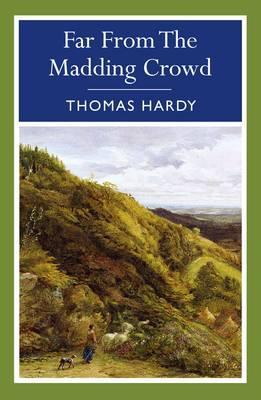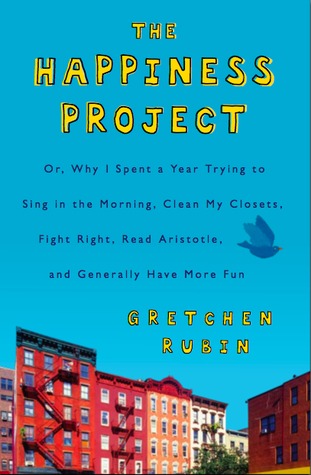Title: Far From the Madding Crowd
Author: Thomas Hardy
Pages: 352
Finished: September 26, 2018
First Sentence: When Farmer Oak smiled, the corners of his mouth spread till they were within an unimportant distance of his ears, his eyes were reduced to chinks, and diverging wrinkles appeared round them, extending upon his countenance like the rays in a rudimentary sketch of the rising sun.
Summary: Bathsheba Everdene takes over her uncle's farm upon his death. While there, she attracts the attention of three different men. Over the course of a year, she runs the farm with an intelligent hand and wards off all her suitors, until she doesn't. Tragedy strikes and int the end, she marries the man she's supposed to.
Thoughts: I have so many. Oh my goodness. Let's start with Bathsheba. I actually really liked her for the most part. Often, when I read classics, I have a hard time believing the characters are the age they are because they act so much older than their age. To be fair, people back then had to grow up quicker, but it's hard for me to believe they are so young because I suppose I read things with a 21st century thought process. But Bathsheba read as young 20s to me. Between her thoughtlessness and her narcissism and just, in general. I didn't like how she thoughlessly sent that Valentine to Boldwood. Not at all. And I had some trouble with how she had a tendency to lead men on. But as I read it, I wondered how much of that had to do with the fact that it was a man writing her. I did appreciate that she knew she didn't want to marry anyone unless she loved them. Of course, I was frustrated that she fell for Sergeant Troy who's horrible, but she did love him. And she was faithful to him. I'm not explaining this well. I don't necessarily want her in a relationship that's horrible for her, but she tries.
Mr. Boldwood. Where do I start. Mr. Boldwood is that guy who you flirt with once and now he expects you to have sex with him. In 19th century terms. This guy infuriated me so much! I felt bad for him for a couple of chapters, but when he kept going on how she owed him, I got more and more frustrated. Suddenly, everything he did for her felt like a guy saying, "look, I helped you so therefore you should be my girlfriend." It was so absolutely disgusting. There was even a bit where it was mentioned that his strength of character bent hers to him that just felt so icky.
Sergeant Troy. Oh my god was he despicable. First and foremost, I did not expect him to actually love Fanny the way he clearly did by the end of the novel. He seemed to be blowing her off through the whole thing. I even expected him to have given her the wrong church in order to avoid the wedding. So I was annoyed that he clearly impregnated her and then came back to Weatherbury to flirt with Bathsheba. (Not that he necessarily knew he had impregnated her... but still.) So instead, he started leading Bathsheba on in ways that were so controlling. Then he agreed to marry her in Bath in a scene we don't know about, so we don't know who pushed whom into it. Then he left, and tried to get her back after abandoning her for a year. I mean, seriously, who does that?!?!
Gabriel Oak. Our stolid farmer who is clearly the one meant for her even though she refuses him the first time. He was not so odious as the others, but I have to admit, I don't know why he fell in love with her right away. Nor did I feel he had the right to get so annoyed when she showed preference to other men. By the end, he grew on me with how much he was willing to protect her even though really that's not his choice.
This is getting long and it's really rambly. I'm sorry guys.
Overall, this is not my most favorite classics, but I do think I enjoy it as one of the better ones I've read this year for my Back To the Classics Challenge. For a book written in the 19th century, there's quite a bit of women's liberation in this that's a bit unexpected. I wonder how it would have read if it was written by a woman. I did have to read passages out loud because I found myself skimming over the pages long descriptions and then not knowing what was going on. Overall though, I'm glad to have read this. I'm interested in hearing why this is one of my dad's favorite books.
Mr. Boldwood. Where do I start. Mr. Boldwood is that guy who you flirt with once and now he expects you to have sex with him. In 19th century terms. This guy infuriated me so much! I felt bad for him for a couple of chapters, but when he kept going on how she owed him, I got more and more frustrated. Suddenly, everything he did for her felt like a guy saying, "look, I helped you so therefore you should be my girlfriend." It was so absolutely disgusting. There was even a bit where it was mentioned that his strength of character bent hers to him that just felt so icky.
Sergeant Troy. Oh my god was he despicable. First and foremost, I did not expect him to actually love Fanny the way he clearly did by the end of the novel. He seemed to be blowing her off through the whole thing. I even expected him to have given her the wrong church in order to avoid the wedding. So I was annoyed that he clearly impregnated her and then came back to Weatherbury to flirt with Bathsheba. (Not that he necessarily knew he had impregnated her... but still.) So instead, he started leading Bathsheba on in ways that were so controlling. Then he agreed to marry her in Bath in a scene we don't know about, so we don't know who pushed whom into it. Then he left, and tried to get her back after abandoning her for a year. I mean, seriously, who does that?!?!
Gabriel Oak. Our stolid farmer who is clearly the one meant for her even though she refuses him the first time. He was not so odious as the others, but I have to admit, I don't know why he fell in love with her right away. Nor did I feel he had the right to get so annoyed when she showed preference to other men. By the end, he grew on me with how much he was willing to protect her even though really that's not his choice.
This is getting long and it's really rambly. I'm sorry guys.
Overall, this is not my most favorite classics, but I do think I enjoy it as one of the better ones I've read this year for my Back To the Classics Challenge. For a book written in the 19th century, there's quite a bit of women's liberation in this that's a bit unexpected. I wonder how it would have read if it was written by a woman. I did have to read passages out loud because I found myself skimming over the pages long descriptions and then not knowing what was going on. Overall though, I'm glad to have read this. I'm interested in hearing why this is one of my dad's favorite books.


